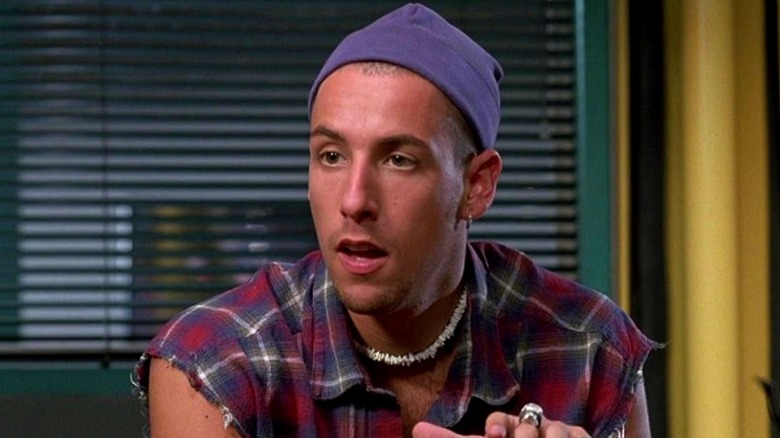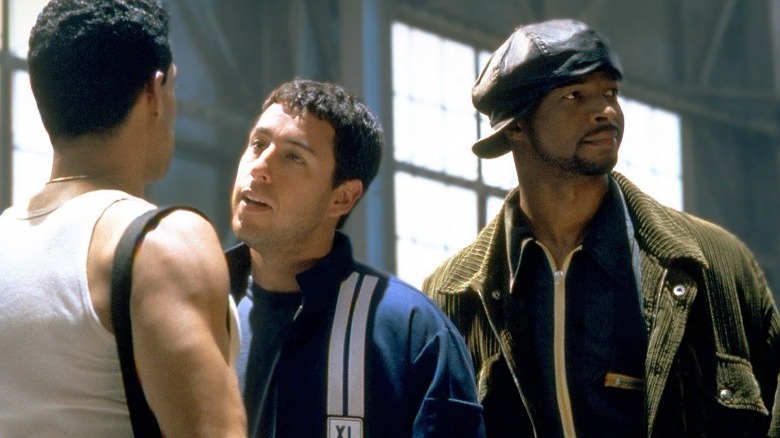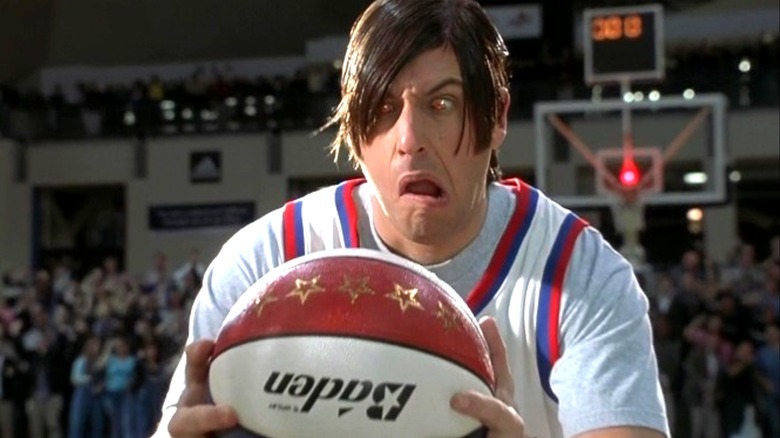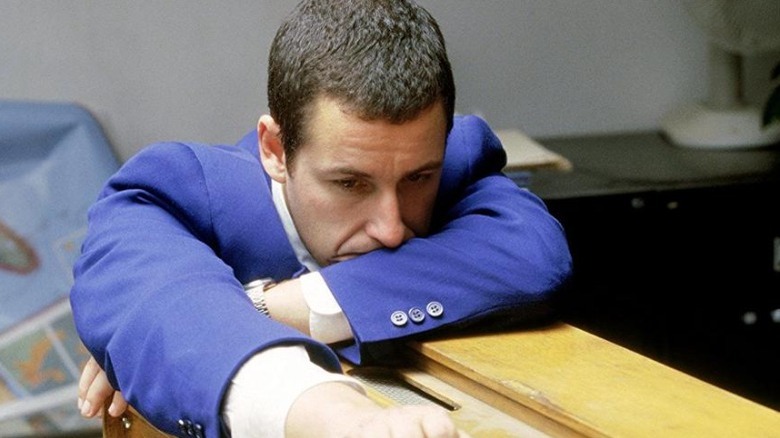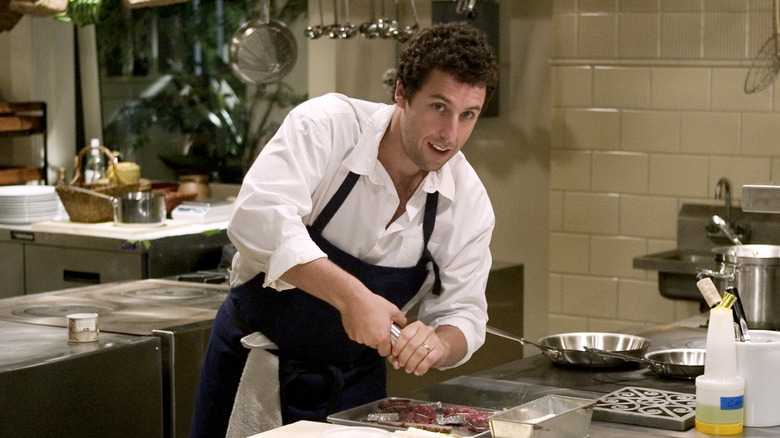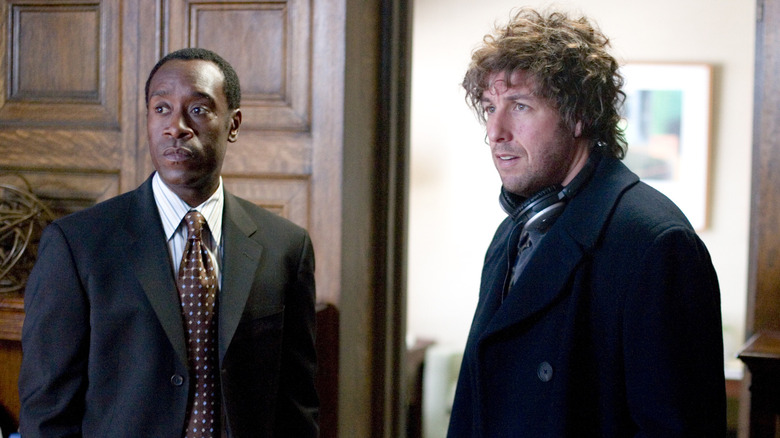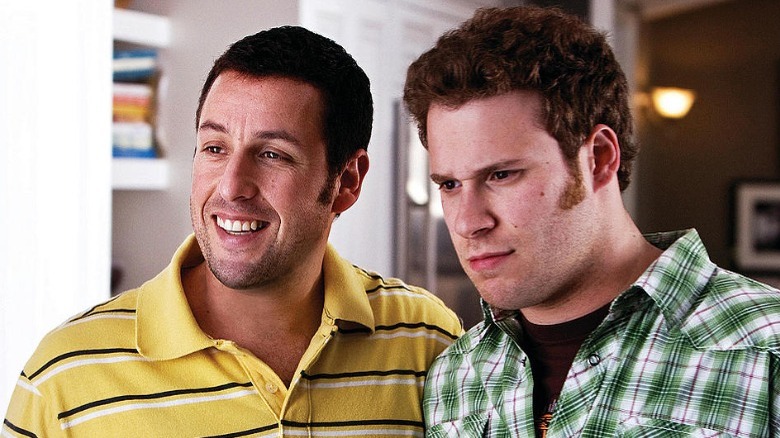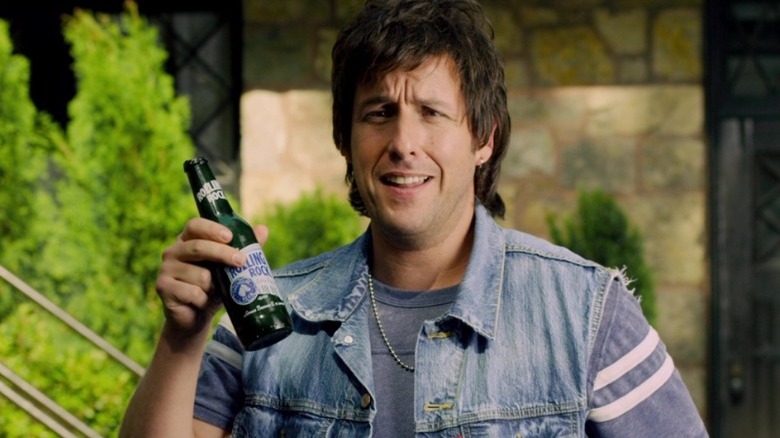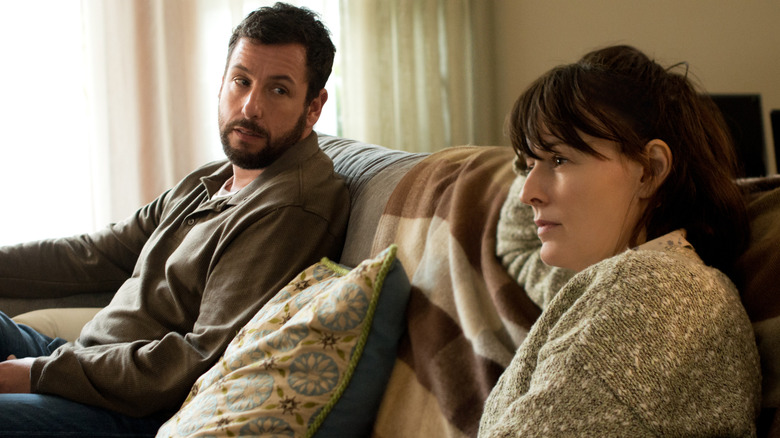Why These Adam Sandler Movies Bombed At The Box Office
Adam Sandler has always been something of a divisive figure in the world of entertainment. Moviegoers seem to either love or hate him, and his filmography is also a mixed bag. While Sandler’s movies continue to dominate Netflix, there is no denying that his efforts have been inconsistent. Sure, he’s had a few big hits during his career, and he’s shown the world that he has some genuine acting chops with films such as “Uncut Gems,” but for every great movie, there’s at least a couple that were financial disasters.
Determining exactly why these movies bombed at the box office can be difficult. Perhaps they came out at the wrong time, like at the tail end of a trend or when people were fatigued with a certain genre. Maybe they faced tough competition from other movies that hit cinemas around the same time. In some cases, the marketing for these films perhaps wasn’t good enough to bring them to the attention of a wide audience. In this article, we’re going to explain why these Adam Sandler films flopped and what exactly went wrong with them.
Airheads (1994)
1994’s “Airheads” stars Adam Sandler alongside Brendan Fraser and Steve Buscemi as three struggling musicians in the metal band The Lone Rangers. After many unsuccessful attempts to get record producers to listen to their music, the trio head to a radio station to try and get a song broadcast. When the DJ refuses to play the song, they hold the place up (with what are later revealed to be plastic guns) in a last-ditch effort to get their demo on the air.
While Buscemi was already well known when “Airheads” came out, neither Sandler nor Fraser were the heavyweights that they would later become. Fraser’s first box office success wouldn’t come until 1997 with “George of the Jungle” and Sandler was still a year away from releasing “Billy Madison,” his breakthrough movie. While Sandler was a regular fixture on “Saturday Night Live,” he didn’t have enough star power to attract large numbers of moviegoers, and a wave of negative reviews likely didn’t help “Airheads,” either.
What’s more, “Airheads” launched when metal music had become unfashionable. Grunge was the in-vogue genre at the time, making it harder to market the film to a wide audience. It grossed just $5.7 million at the U.S. box office, and, with a reported budget of $11 million, became known as a flop. “Airheads” went on to become something of a cult hit in metal circles, but was otherwise lost to history.
Bulletproof (1996)
Adam Sandler was in high demand after “Billy Madison” and “Happy Gilmore” proved that he was capable of fronting a big screen comedy. His next project involved a collaboration with Damon Wayans: The duo teamed up for a buddy cop action comedy called “Bulletproof,” which was basically an attempt to create a funnier version of “Lethal Weapon.” However, while that Mel Gibson/Danny Glover flick was a big hit, “Bulletproof” became a box office misfire.
“Bulletproof” follows Sandler’s Archie Moses, a drug dealer who is unaware that his friend and colleague Jack Carter (Wayans) is actually an undercover cop. Following a mishap that sees Moses shoot Carter, the two end up on a cross-country journey to testify in court, all while being pursued by drug lord Frank Colton (James Caan). The film reportedly cost around $25 million to make, but it couldn’t even recoup that amount, pulling in just $22 million worldwide.
The film’s failure wasn’t a huge surprise considering its reviews. It was lambasted by critics and is regarded as one of Adam Sandler’s worst movies – in fact, only “Jack and Jill” and “The Ridiculous 6” have lower scores on Rotten Tomatoes. The general consensus is that the film failed at the box office because it wasn’t sure what it wanted to be. “Bulletproof” isn’t funny enough to be a hit comedy, and the action scenes aren’t exciting enough to entice adrenaline junkies. The box office receipts made it clear that viewers weren’t going to accept Sandler as an action star.
Little Nicky (2000)
Written by Adam Sandler and longtime collaborator Tim Herlihy, “Little Nicky” sees Sandler play the kind-hearted son of the devil. Sensing that none of his sons are ready to take over the rule of hell, Satan extends his reign, much to the anger of his two other sons. When they revolt and head to Earth to cause chaos and establish a new hell, Nicky is sent by Satan to put a stop to his brothers’ plans. Harvey Keitel plays Satan, with cameos from the likes of Carl Weathers, Quentin Tarantino, and Ozzy Osbourne
“Little Nicky” is among Sandler’s biggest financial failures. A large part of that is down to the fact that “Little Nicky” was so expensive to make. While the film managed a worldwide box office gross of $58 million, it had a production budget of $80 million, more than four times the budget of “Billy Madison” and “Happy Gilmore” combined. That made it incredibly hard for the film to be a financial hit, given the amount of tickets it would have to sell.
Of course, there are other reasons why “Little Nicky” didn’t make more money. It had a disastrous reception from critics for one, and it also faced competition from another Satan-inspired movie in the form of the Brendan Fraser and Elizabeth Hurley comedy romance “Bedazzled,” which was released just a month earlier. The fact that Sandler’s character was plain annoying was the nail in this film’s coffin.
Punch-Drunk Love (2002)
1998’s “The Wedding Singer” — a financial and critical success — proved that Adam Sandler could be a hit in romance-leaning films as well as straight comedies. As such, many people expected “Punch-Drunk Love” to be another triumph, especially given it was written and directed by acclaimed filmmaker Paul Thomas Anderson. Sandler play Barry Egan, a socially awkward and occasionally violent business owner who falls in love with Emily Watson’s Lena Leonard. Their budding relationship faces a number of struggles, including an extortion attempt.
Unlike the majority of Adam Sandler’s box office bombs, “Punch-Drunk Love” garnered favorable reviews from critics and was generally well-liked by those who saw it in cinemas. But it was also very different from the type of projects associated with Sandler. The actor seems an odd fit for an Anderson film, a director known for his grand artistic movies such as “Magnolia” and “Boogie Nights.” Sure, it proved that Sandler could act, but it didn’t appeal to his regular fanbase, which was a big reason it failed financially.
The same could also be said of the director: “Punch-Drunk Love” marked a different direction for Anderson. Speaking to the Los Angeles Times, the respected filmmaker revealed that he set out to do something entirely different this time, “to strive for a 90-minute length, to strive for romantic comedy,” as he put it. “I felt like I’d become pretty good to a certain extent at my job,” he said, adding, “I wanted to scare myself.” Unfortunately, he seemed to scare off fans of his other films.
Eight Crazy Nights (2002)
Although he went on to star in the “Hotel Transylvania” films, Adam Sandler was not known for animated fare when “Eight Crazy Nights” dropped in 2002. The movie follows Davey Stone, a man in his 30s who is constantly in trouble with the law. After dining and dashing, he is given one last chance at redemption and ordered to carry out community service under the watchful eye of basketball referee Whitey Duvall. Along the journey, Stone learns about the true meaning of Hanukkah. Sandler voices both characters, along with several others.
“Eight Crazy Nights” reportedly cost $34 million to make, but it only grossed $23.5 million, and much of that is the result of the film just being plain terrible. It drew the ire of critics for a predictable story and bizarre product placements, as well as unfunny and outdated jokes. What’s more, audiences had already seen a lot of Sandler in 2002, with the actor appearing in “Punch-Drunk Love” and “Mr. Deeds” earlier that year.
The holiday schedule that it dropped into was also highly competitive, which made making a profit even less likely. What’s more, the film was made using traditional 2D animation. There was nothing wrong with it — in fact, the impressive animation is the best thing about “Eight Crazy Nights” — but this was an era when CGI films were all the rage. Traditional, hand-drawn animation seemed quaint and old-fashioned next to the films being put out by Pixar and DreamWorks.
Spanglish (2004)
James L. Brooks returned to the director’s chair for 2004’s “Spanglish,” seven years after his critically acclaimed dramedy “As Good as It Gets.” Adam Sandler stars as the patriarch of the Claskys, a well-off family that includes his overbearing wife Deborah (Téa Leoni) and their two children. When the family heads to Malibu for the summer, they take along their Mexican housekeeper Flor Moreno (Paz Vega) and her daughter. Much of the plot revolves around the interactions between the two families and how they differ.
Though it certainly fared better than many of Sandler’s other releases around that time, “Spanglish” didn’t exactly set the world on fire in terms of critical reception. That goes some way to explaining why it bombed at the box office, making $52 million worldwide from a budget of $75 million. However, there were some other factors that contributed to its poor box office performance.
What really made life difficult for “Spanglish” was the fact it came out amid a packed release schedule. December 2004 saw big hitters such as “Meet the Fockers” and “Ocean’s Twelve” arrive in cineplexes, as well as family friendly films such as “A Series of Unfortunate Events” and the Tom Hanks-led Christmas movie “The Polar Express.” This array of films ticked all the boxes for the type of moviegoer that might have otherwise opted to see “Spanglish” on the big screen.
Reign Over Me (2007)
Some of the best Adam Sandler movies are those where the actor takes on a dramatic role. While he has comedic roots and is best known as a comedy performer, Sandler has shown over the years that he is a capable actor who is talented enough to lead a drama. “Reign Over Me” focuses on former college roommates Charlie Fineman (Adam Sandler) and Alan Johnson (Don Cheadle), who reunite and help each other through significant turning points in their lives.
Despite having more critical success with his dramatic performances, these types of Adam Sandler films have never been a particularly big draw when it comes to audience numbers, and the same is true of this Mike Binder buddy drama. It wasn’t at all surprising that “Reign Over Me” struggled to attract a lot of paying customers, despite being a pretty good movie. In the end, it managed a worldwide gross of $22 million against a budget of $20 million, making it a failure after marketing and other costs were factored in.
Perhaps the main reason the film failed to attract big viewer numbers is the subject matter. Sandler’s Charlie is a man who is clearly struggling to process the fact that his wife and daughters were killed during the 9/11 terrorist attacks. Those events were still too fresh for many moviegoers, something Binder was well aware of. Speaking to Entertainment Weekly about the risky movie, the director said: “I don’t believe in looking down and seeing how far the fall is to the ground — especially in this situation because that’s what made it interesting to me. It was a story worth telling.”
Funny People (2009)
On paper, the Adam Sandler film “Funny People” probably looked like a guaranteed hit. It was written and directed by Judd Apatow, and it features talented performers like former “Freaks and Geeks” star Seth Rogen, Leslie Mann, Jonah Hill, and Jason Schwartzman. Yet, it somehow failed to make a splash at the box office, bringing in $71.5 million against a production budget of $75 million. So what went wrong?
Well, the main issue is that the film has an unusually dark and depressing tone for a comedy. The story revolves around Sandler’s George Simmons, a movie star and stand-up comedian who has become disenchanted with the entertainment industry. Upon being diagnosed with cancer, he takes an interest in an aspiring comic while also attempting to re-evaluate his life and his relationships. It’s pretty heavy stuff.
In the end, moviegoers weren’t sure if they were paying to see a comedy or a drama, which clearly impacted the overall takings. Limiting its audience further was a mighty running time of 146 minutes, typical for Judd Apatow but far longer than most comedies. There’s also the fact that the film landed an R-rating, restricting the amount of people actually able to see it. Had “Funny People” been a PG-13 film it might have been a box office success, but it may have lost some of its bite in the process.
That’s My Boy (2012)
“That’s My Boy” is a film that follows the same basic structure as most Adam Sandler movies, in which the exact same things tend to happen, only the jokes are a lot more dirty than usual. It stars Sandler as Donny Berger, an unemployed slacker who is on the verge of going to jail for debts owed to the IRS. His only way out is to reunite with his estranged son Todd (Andy Samberg), who he fathered with a teacher while he was in school.
Critical reception for “That’s My Boy” was low, and that likely impacted the film’s earning potential, but there was more to it than that. One of the major issues was that this 2012 movie was such a departure from Sandler’s other comedies: It had a far raunchier plot and a bizarre premise that involved statutory rape, with a later twist throwing incest into an already problematic mix. It’s not surprising that it underperformed at the box office, grossing just under $58 million from a budget of $70 million.
Sandler proved once again with “That’s My Boy” that he doesn’t have the same sort of box office sway with R-rated films as he does with his PG-13 releases. His earlier R-rated films include “Bulletproof,” “Punch-Drunk Love,” and “Reign Over Me,” all of which were box office disappointments. Going above PG-13 on the rating scale usually spells box office disaster for Sandler, and that was very much the case here.
Men, Women & Children (2014)
Directed by Jason Reitman and based on the Chad Kultgen novel of the same name, 2014’s “Men, Women & Children” was a box office disaster of epic proportions. Adam Sandler is part of an ensemble cast that includes the likes of Rosemarie DeWitt, Jennifer Garner, Judy Greer, Dean Norris, Ansel Elgort, Kaitlyn Dever, and Timothée Chalamet. They play various characters in interconnected stories about families and individuals dealing with the internet and digital technology. The film’s opening takings were the fifth-worst ever based on a movie with a wide release and it ended up grossing just $1.7 million worldwide.
How did this happen? The star power was there, but the book was clumsily adapted for the screen and the marketing campaign from Paramount was pretty much non-existent. Perhaps execs were relying on the names involved to get bums in seats, but that’s never a good strategy. “It’s a myth to say that people that people show up reflexively. Stars generate interest, but there has to be a story that people care about,” BoxOffice.com’s vice president and senior analyst Phil Contrino told TheWrap. “Look at Tom Hanks and ‘Cloud Atlas.’ He worked very hard to promote that movie, but it still wasn’t enough.”



